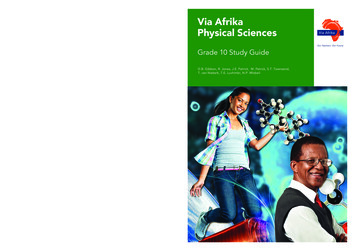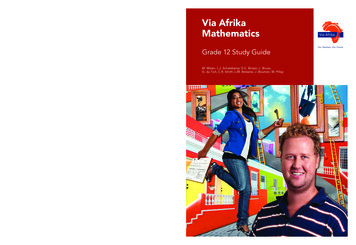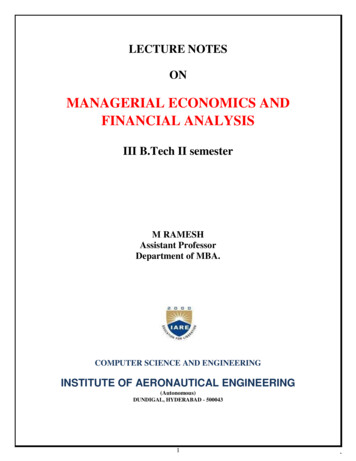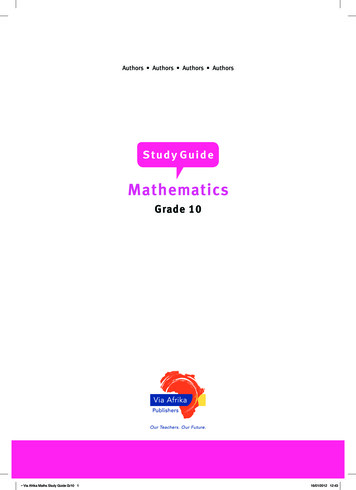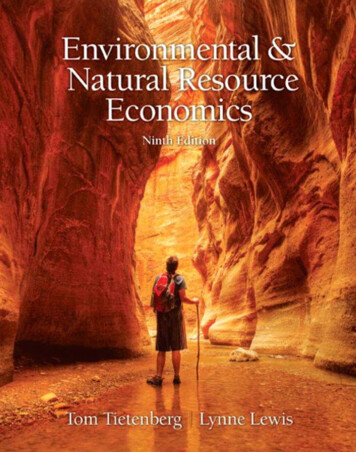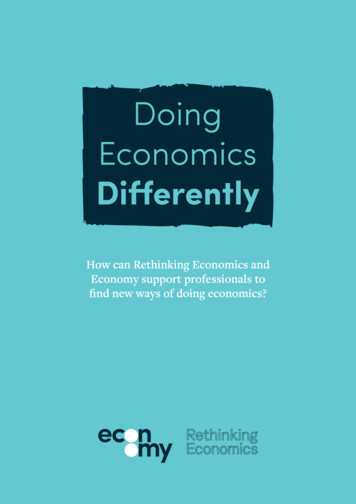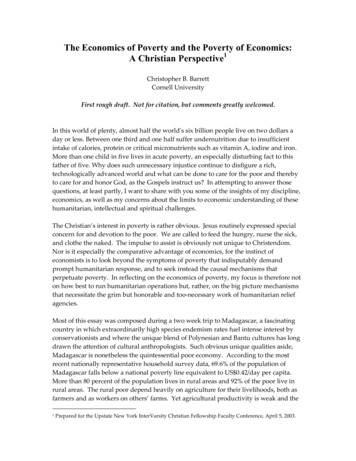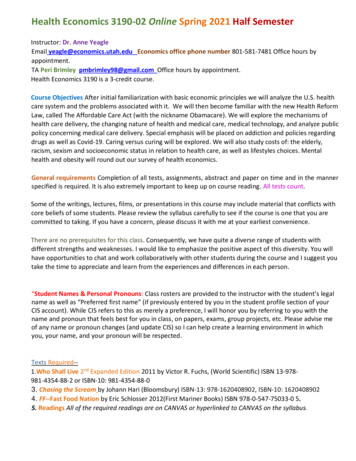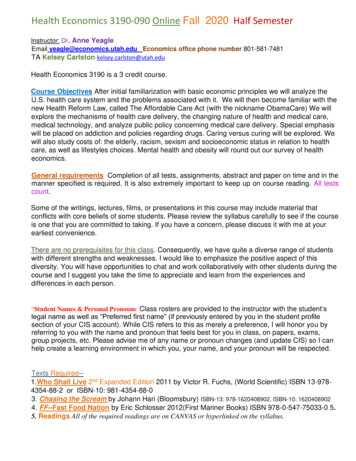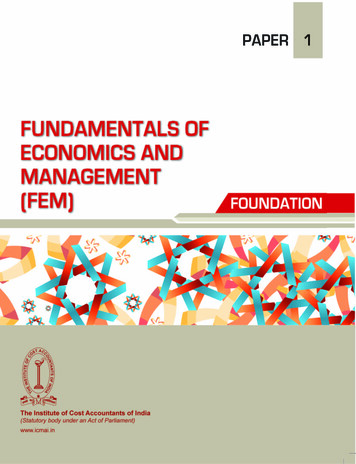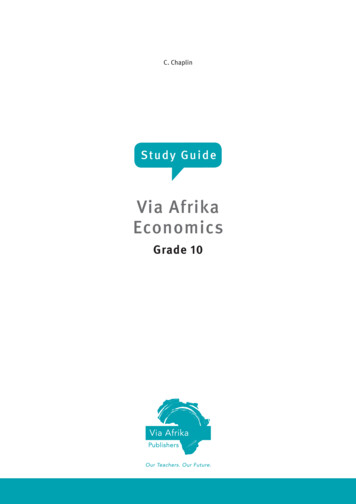
Transcription
C. ChaplinStudy GuideVia AfrikaEconomicsGrade 10
ContentsIntroduction to Economics.vTopic 1 What is Economics? .1overview.1Unit 1 Basic concepts . 2Unit 2 The methods of economics . 4Unit 3 The settling of economics within the field . 6Questions. 7Topic 2 The basic economic problem . 9overview. 9Unit 1 The problem of scarcity .10Unit 2 Production, exchange and consumption.12Unit 3 Sustainable development and human rights. 15Questions.16Topic 3 Circular flow and quantitative elements.18overview.18Unit 1 The participants in the economy.19Unit 2 Markets. 22Unit 3 Deriving GDP. 24Unit 4 Deriving gross national income. 26Unit 5 Comparing GDP and GNI.27Questions. 28Topic 4 Business cycles. 30overview. 30Unit 1 The phenomenon of business cycles.31Unit 2 Ways of representing business cycles.33Unit 3 Reasons for business cycles. 38Unit 4 Effects of business cycles.41Unit 5 Effects on people who are economically vulnerable. 42Questions. 44Topic 5 The dynamics of markets. 46overview. 46Unit 1 The market as a phenomenon.47Unit 2 Types of markets. 49Unit 3 Why prices are important in the market. 51Unit 4 Demand, supply and price.52 Via Afrika » Economics
ContentsUnit 5 Supply and price. 54Unit 6 Price formation. 56Unit 7 Functions of markets. 58Questions. 60Topic 6 The production possibility curve. 62overview. 62Unit 1 Resource allocation. 63Unit 2 Maximising satisfaction – indifference curves. 66Unit 3 Market failures – inefficiencies. 67Questions. 69Topic 7 The public sector.72overview.72Unit 1 Reasons for public sector intervention.73Unit 2 Kinds of intervention.74Questions. 78Topic 8 Growth, development and globalisation. 80overview. 80Unit 1 The emergence of trade.81Unit 2 Evolution of markets. 82Unit 3 Governments and the regulation of markets. 84Unit 4 Industrial development. 85Unit 5 Economic institutions. 86Questions. 87Topic 9 South African economic growth and development. 89overview. 89Unit 1 Animal husbandry and agriculture. 90Unit 2 Agriculture and mining. 92Unit 3 Mining and industry: 1910 to 1990s. 94Unit 4 Manufacturing and services: since 1990.97Questions.100Topic 10 The history of money and banking in South Africa. 101overview. 101Unit 1 The history of money.102Unit 2 The history of banking in South Africa.104 Via Afrika » Economics
ContentsUnit 3 The South African Reserve Bank.106Unit 4 Recent trends in banking. 107Questions.108Topic 11 Population and labour force trends. 110overview. 110Unit 1 The population of South Africa.111Unit 2 The South African labour force. 114Questions. 116Topic 12 Unemployment. 117overview. 117Unit 1 The nature of unemployment. 118Unit 2 Approaches to solving the problem of unemployment. 123Unit 3 Economically marginalised groups. 125Questions. 127Topic 13 Labour relations.128overview.128Unit 1 The labour market in South Africa.129Unit 2 The objectives of the Labour Relations Act. 133Unit 3 Labour rights and conventions. 135Unit 4 Collective bargaining and dispute resolution. 137Unit 5 Labour Courts. 139Questions.140Topic 14 Economic redress.142overview.142Unit 1 Meeting basic needs. 143Unit 2 Human resources.144Unit 3 Natural resources.146Unit 4 Capital.148Unit 5 Entrepreneurship . 150Unit 6 Democratisation of economic procedures. 152Unit 7 Macroeconomic adaptations. 154Questions. 157Exam Papers. 159Answers. 167Glossary. 179 Via Afrika » Economics
Introduction to EconomicsWhy is Economics important?Economics is an exciting and interesting subject to study because it touches every areaof your life. There is nothing that you do that is not related to economics. We all makeeconomic decisions every day of our lives, and economics can help to improve ourdecision-making. Economics offers a way of thinking about the world that enables us tomake the best of what we have.In your Economics studies this year, you will look at major challenges in South Africa,such as unemployment and poverty. You will gain insight into how our governmentmakes plans and policies to deal with issues such as these.Economics not only provides you with the knowledge and insight necessary tounderstand the impact of developments in business, society and the world economy,but it also helps you to understand the decisions of households, firms and governments.Economics is about choice, scarcity, opportunity, and the impact of decision-making onaspects of society.Economics is concerned with understanding how society sets about meeting people’sdemands for things they want to consume. It also compares alternative ways of usingthe limited resources that countries and individuals possess and considers how efficientand/or fair such alternatives are. You will find it interesting to compare how differentcountries solve the problem of limited resources.Economics also relates to a whole range of other subjects. Economics is closely relatedto history because in order to have a good understanding of how economies function,it also helps to be able to see economic problems in their historical context and howeconomic ideas have developed over time. Other subjects that are closely related toeconomics include business studies, human geography and psychology. To be able toanalyse economic problems, you will use a number of techniques. Some of these aremathematical and/or statistical.Start studying early for your exams! This study guide is designed to help you with yourfinal revision before exams. It will take you through the text book with which you areworking and also gives you practice examples, exam papers and answers. It does notreplace your text book. The study guide will give you: sample exam questions and answersan overview of each module Via Afrika » Economicsv
a review of the main concepts in each modulepractice use the exams and questions to get a feel for the style of the questions youmight be asked.Economics is a dynamic and worthwhile field of study because it deals with importantand interesting subjects such as capitalism versus socialism, management of inflationand unemployment, economic development of poor countries, pollution and manyspecific government policies, such as deregulation of electricity, the minimum wage,agricultural price supports, and rent control. Enjoy your studies! Via Afrika » Economicsvi
TopicUnit XX1What is Economics?OverviewTOPIC 1Page 1What is Economics?UNIT 1Page 2UNIT 2 Page 4Branches of economicsinternational, monetary, public,development, labour andenvironmentalEconomic models and theories –positive and normative statementsThe difference between micro- andmacro-economicsEconomic questions and decisions:What, how and by whom?Types of economic systems:Traditional, command, market andmixedDifficulties faced by economistsUNIT 3 Page 6Economics as a social science –relationship to other sciences andcareer opportunitiesThe economic problemScarcity, limited means andunlimited wantsTopic 1 looks at the basic concepts or ideas that you will encounter in the study ofEconomics. It is important that you be familiar with these concepts because they will beused a lot during your studies. You also need to understand how economics is studiedby economists and how it relates to other branches of science. Via Afrika » Economics1
Unit XX1Basic concepts1.1 Basic concepts Economics is the study of how individuals, businesses, governments and otherorganisations within our society choose to use scarce resources to satisfy theirunlimited wants and needs.Resources are limited so we need to know how to work with them without wastingthem.Because we cannot satisfy all our wants and needs, we have to make choices aboutwhich needs to satisfy and which not.1.1.1 The economic problem THE BASIC ECONOMIC PROBLEM is scarcity: the problem arises because resourcesare scarce, but human wants are unlimited.Humans only have a limited amount of money. Yet they have lots of needs and wantsto satisfy.shoppingDVDsholidaysMoney The government also has a limited amount of money and is unable to satisfy all itswants.schoolshealthpoliceR440 billion Government Via Afrika » Economics2
Unit1The economic question is: What should be produced?How should it be produced?For whom will it be produced?1.1.2 Branches of Economics Microeconomics looks at individual decisions. This includes the decisions of firms aswell as consumers.Macroeconomics studies the operation of the economy as a whole and deals withissues such as unemployment, inflation, growth, and monetary and fiscal policy.Scarcity (the limited supply of resources relative to people’s needs and wants) is anissue in both macro- and microeconomics.Economics can be further subdivided into various sections Monetary economics studies money, how it is controlled and how it is used. Public sector economics studies the role of the government in economics. Developmental economics studies policies and strategies that help developingcountries to grow. Labour economics studies the demand and supply of labour and its effects on theeconomy of a country. Environmental economics looks at issues which affect the environment. International economics studies international trade and finance.1.1.3 Approaches of Economics Economists study the world around them and gather the facts and observationsabout how people behave when they produce, exchange and consume goods andservices.Economists use what they observe to create theories and principles.They either:make deductions by drawing up theories and testing them against the facts to seewhether a certain theory fits the factsorinduce theory by processing facts to create a theoryoruse a combination of deduction and induction.Economics studies how people behave with regard to money.The so-called ‘laws’ in economics are in fact more like general statements than laws. Via Afrika » Economics3
Unit XX2The methods of economics1.2 The Methods of Economics1.2.1 Economic modelsAn economic model is an attempt to explain or predict how a set of circumstances willbehave if a variable changes. We use data or information to build economic models.1.2.2 Positive and normative statementsPositive economics deals with objective explanation and the testing and rejection oftheories. For example: A rise in consumer incomes will lead to a rise in the demand for new cars.A fall in the exchange rate will lead to an increase in exports overseas.More competition in markets can lead to lower prices for consumers.Normative economics deals with opinions about what ought to be. These aresubjective statements rather than objective statements – i.e. they carry valuejudgments.For example: The level of duty on petrol is too unfair and unfairly penalises motorists.The government should increase the national minimum wage to R60 per hour inorder to reduce relative poverty.The retirement age should be raised to 75 to combat the effects of our ageingpopulation.1.2.3 The scientific methodEconomics is a science, and economists remain as objective as possible about the topicsthat they study. They use the scientific method: They formulate a question.They conduct an investigation.They draw a conclusion. Via Afrika » Economics4
Unit21.2.4 Difficulties faced by economistsEconomics is a social science. Economists study how people behave with regard tomoney. It is a difficult field of study because: People all think and behave differently. You cannot run laboratory tests to checkhow people will react to a specific change in one variable, as you could with aphysical science.It is difficult to run a controlled test to see how people will react to a change.It is difficult to change just one variable and keep all other variables constant.Economists are often biased.Results are less precise than in physical sciences.Economic laws are more like general statements than laws; they are not exact. Via Afrika » Economics5
Unit3The settling of economics within the field1.3 The settling of economics within the field1.3.1 Economics and other sciencesEconomics overlaps other subjects because Economics studies people and theirbehaviour.Economics has most in common with the following subjects: AccountingBusiness studiesCommercial lawMathematics of finance1.3.2 Relationship with other sciences and career opportunitiesEconomics is useful for many career choices. The table in your textbook shows howeconomics overlaps with other fields of study and how this provides careeropportunities.Career opportunities using economics can be found in: StatisticsMathematicsInformation technologyLawPoliticsSociologyGeography Via Afrika » Economics6
TopicUnit XX1QuestionsQuestion 1: Fill in the missing words1.1. The problem of scarcity in the economy centres around . means andunlimited wants.(2)1.2. The . method means that from specific assumptions certain deductionsand conclusions can be made.(2)1.3. From the definition of economics it is clear that . is the key problem ofeconomics.(2)Question 2: True or False1. Economics is a social science.(2)2. Macro economics studies the economic behaviour of the individual consumerand the individual business enterprise.(2)3. Economic goods are found in unlimited quantities.(2)Question 3: Multiple choiceSelect the correct alternative:3. 1 Economics is the study of people’s behaviour in their attempts to satisfy theirA limited wants with unlimited meansB limited means with unlimited wantsC unlimited wants with unlimited meansD unlimited wants with limited means.(2)3.2 Economics is a social science and for this reason, it is more correct to refer toits basic principles as:A economic tendenciesB economic lawsC economic trendsD economic by-laws.(2) Via Afrika » Economics7
TopicUnit XX1Questions3.3 Economics is a science which studies how to:A make moneyB make the best use of scarce resourcesC redistribute income to the working classesD give people all they want.Question 4Use your textbook to fill in the following table to show the differences between positiveand normative economics.Positive economicsNormative economicsQuestion 5Use your textbook to fill in the following chart explaining how economics overlaps withother subjects and creates job opportunities.SubjectContent of subjectSuggested careersStatisticsMathematicsInformationtechnology (IT)LawPoliticsSociologyGeography Via Afrika » Economics8
TopicUnit 2XXThe basic economic problemOverviewTOPIC 2Page 9The basic economic problem ofscarcityUNIT 1Page 10UNIT 2 Page 12Absolute and relative scarcityProduction factorsland, labour, capital andentrepreneurshipOpportunity costs – of one goodover anotherSectors of production primary,secondary and tertiaryUNIT 3Page 15Human rights and economicdevelopment sustainabledevelopment and governmentactionsPublic and private sectors of theeconomyFormal and informal sectors of theeconomyConsumer groups households,businesses, governmentConsumptioncapital and consumerExchange and bartering disposableincome, exchange ratesTypes of Goodsdurable, semi durable, non durableand servicesEconomic and free goodsIn Topic 2, you will look at how we attempt to solve the economic problem. You will alsostudy the components of the economy: production, exchange and consumption, andthe importance of protecting both human rights and the environment when makingeconomic decisions. Via Afrika » Economics9
Unit XX1The problem of scarcity2.1 The problem of scarcityThe basic economic problem involves scarcity, making choices and the opportunitycosts of those choices.2.1.1 Absolute and relative scarcity Absolute scarcity exists when we have enough resources to buy a good but it is justnot available, for example if the potato harvest failed there would be an absolutescarcity of potatoes because none would be available.Relative scarcity exists when there are enough goods to satisfy a population’sneeds but most of the population are too poor to buy them. This situation exists indeveloping countries.2.1.2 Economic goods and free goods Free goods are those we don’t pay for, such as sunlight or rain.Economic goods are produced at a cost from scarce resources, so people have to payfor them. The differences between economic and free goods are shown in Table 2.1 inyour textbook.2.1.3 Alternatives and opportunity costsChoice is part of the economic problem. Because we have limited (scarce) resources, wehave to make a choice how best to use them. We have to choose between alternatives. If you have R40 in your pocket, you can decide to spend it in a number of ways. Youcan save all of it, or use some of it to buy snacks or see a movie. You can choosehow to spend your money. There are a number of alternatives you can consider butyou cannot do everything. This is called Opportunity Cost because you choose onealternative over another.Individual – if we plant potatoes in our garden, we have less room for carrots.Firm – if the resources of a chocolate factory are used to make milk chocolate thenthey have less resources available for plain chocolate.Government – if more schools are built, there is less money for hospitals. Via Afrika » Economics10
Unit1Examples of Opportunity CostAssuming I have R100 to spend, and I can only buy magazines at R25 each or take-awayburgers, also at R25 each, then I can use my money in several ways.If I buy 4 burgers, how many magazines can I buy? None.Complete the chart underneath showing the different choices you can make with R100.No of burgersNo of magazines43210Who is making thechoice?What they chooseThe opportunity cost(what they could have had)Business New computersNew workersOffice party New faxDelivery vanPay for boss!Government Unemployment benefitWeapons New roadsMore hospital bedsIndividuals Mars barT-shirtBeach holiday Twix barDVDFixing the roof Via Afrika » Economics11
Unit XX2Production, exchange and consumption2. 2 Production, Exchange and ConsumptionThe three basic processes in a modern economy are: productionexchangeconsumption.2.2.1 The four production factors are Land – the natural resources on the planet. It includes space on the ground,minerals, food, timber and water.Labour – the human input (workers, managers, etc) into the production process.Each individual has a different level of skills, qualities and qualifications. This isalso called human capital.Capital – all the money used to buy capital goods (for example, buildings,machinery, vehicles, tools and materials) to produce goods and services.Entrepreneurship – the person who organises the other three factors of productionto produce goods and services to sell. They risk their own resources in businessventures.2.2.2 Public and private sectors The public sector – all the industries and enterprises that are owned and controlledby the government, such as public hospitals and clinics, public schools, correctionalfacilities (prisons), provincial and municipal offices, water supply and the railways.The private sector – all the industries owned and controlled by private individuals orgroups.2.2.3 Formal and informal sectors of the economy The formal sector: this is made up of all the registered businesses in the country.Only the production that takes place in the formal sector is taken into account whenwe calculate the GDP of the country.The informal sector: this is made up of all the businesses that are not registered,such as street vendors. Because these businesses are not registered, there is noofficial record of their production, expenditure, income and profit/loss. We don’tinclude them when we calculate the country’s GDP. Via Afrika » Economics12
Unit22.2.4 Primary, secondary and tertiary sectors of the economy The primary sector of the economy involves the collection of raw materials, forexample, mining, agriculture, fisheries and forestry. Farmers plant crops and harvestthem when they are ripe. Miners take coal and gold from the mines. The primarysector does not involve any processing of the raw materials. This sector is the mostimportant sector in the economies of most developing countries.The secondary sector of the economy involves processing or manufacturing. In otherwords turning the raw materials from the primary sector into finished products.Factories that process food, paper-making, oil refineries and assembly plants wheretrucks and cars are built are all part of the secondary sector of the economy.The tertiary sector of the economy is the service sector of the economy. The tertiarysector includes goods that people consume and services that are offered, such ashairdressing, taxis, etc.2.2.5 ConsumptionPeople and businesses consume two types of goods: capital goods, which are goods that are used to produce other goods and services;tools and machinery are examples of capital goods.consumer goods, which are goods that are the final products we buy from shops.We use capital goods to produce consumer goods.2.2.6 Types of goodsThere are three types of consumer goods: Durable goods, which are goods that can be used over a long time, for example, arefrigerator, a car or carpets.Semi-durable goods include goods such as clothing, footwear, textiles andfurnishings that last for some time but not as long as durable goods.Non-durable goods (which also include perishable goods) are goods that you canonly use once, for example, food, washing powder and petrol. Food is a perishablegood.Services include items such as banking, health care, telecommunications,entertainment and transport. Via Afrika » Economics13
Unit22.2.7 Three groups of consumers Households, which mainly spend their income on durable goods, perishable goodsand services.Businesses, which mainly spend their money to invest in capital (raw materials,machines, buildings) for their production process.Government, which mainly spends its money on public goods (for example, nationalparks, street lighting and roads) and merit goods (for example, education).2.2.8 Exchange and bartering Disposable income is the income we have t
Economics can be further subdivided into various sections Monetary economics studies money, how it is controlled and how it is used. Public sector economics studies the role of the government in economics. Developmental economics studies polici

